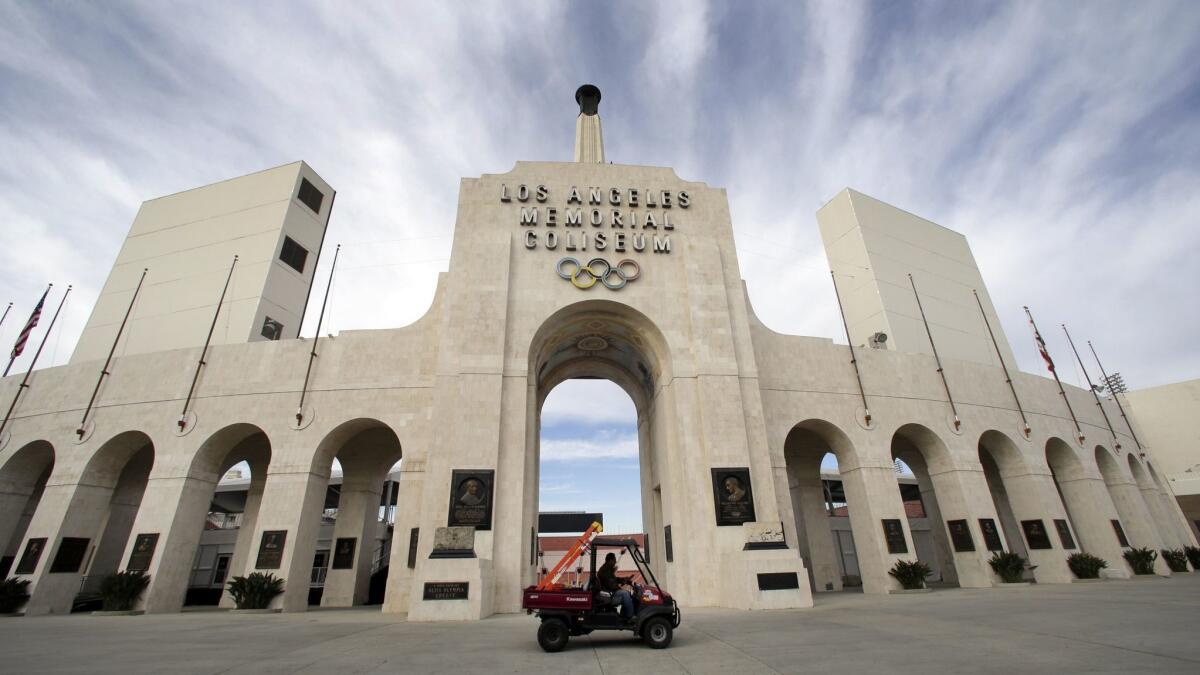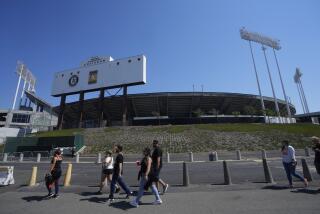The $69-million Coliseum naming-rights deal between USC and United is in limbo

- Share via
The sound of cymbals beat through the United terminal at Los Angeles International Airport until the Trojans marching band stopped at Gate 73.
There, between a steakhouse and Hudson News, the band waited for the conductor’s whistle. Nearby, three cheerleaders fluttered cardinal red and gold pompoms as puzzled passengers recorded the spectacle on their phones.
The event — which streamed live on Facebook in January 2018 — was part of the elaborate announcement of a $69-million deal between USC and United Airlines, in which the airline agreed to help fund renovations at Los Angeles Memorial Coliseum, where the Trojans play football. In exchange, the stadium would get a new name: United Airlines Memorial Coliseum.
But now, less than half a year before the name change was expected to take effect, the deal has begun to unravel. A corporate rebranding of the Coliseum — a national historic landmark built in memory of those who fought in World War I — enraged some Angelenos, including politicians and some veterans groups.
The opposition grew louder Monday when L.A. County Supervisor Janice Hahn offered a forceful rebuke of the proposed name in an opinion piece published by The Times.
“Los Angeles Memorial Coliseum is not just a stadium — it is a war memorial. Removing ‘Los Angeles’ and replacing it with a corporate sponsor insults the memories of those the Coliseum was intended to honor,” wrote Hahn, president of the Los Angeles Memorial Coliseum Commission, a state-county-city agency that gave USC control of the stadium under a 98-year lease.
The voices of Pope John Paul II, John F. Kennedy, Billy Graham and Nelson Mandela have all echoed through the stadium’s concrete bowl, Hahn wrote, and the stadium has hosted two — soon to be three— Summer Olympics. The Coliseum will be among the primary facilities used in the 2028 Games.
“Throughout it all,” Hahn wrote, “Los Angeles has never broken faith with the Coliseum’s dedicatory purpose. We’ve never messed with its name, which resides in the National Register of Historic Places. Until now.”
Hahn started an online petition, hoping to pressure USC’s incoming president, Carol L. Folt, to back out of plans to rename the stadium. (The initial naming-rights agreement was brokered during the controversial tenure of university President C.L. Max Nikias.)
For Kyle Orlemann — whose husband, father, grandfather and great-uncles served in the military — the proposed name change feels like a personal insult to those who fought in World War I, which lasted from 1914 to 1918.
“It’s a poor choice,” she said. “The people who went there and bled there and died there have family, and these memorials are important to their family members.”
Orlemann, 65, of Hawthorne, learned about the proposal from her husband Tuesday and immediately thought of her great-uncle, Stan, and the letters he wrote home during the war, which she inherited when her mother died.
There was the postcard he sent from the border of Italy and France and the longer letter in perfect cursive, which he wrote from the trenches during the Battle of Chateau-Thierry. And then there was the note in which her great-uncle, a sergeant, explained that another boy from his small farming town in Indiana had died and that he hoped to find his grave so he could fix it up. That way, he wrote, when he returned home, he could at least tell the boy’s family that the soldier had a proper burial.
Orlemann attended a Coliseum Commission meeting Thursday, at which several veterans shared their views on the issue. Like many others in attendance, she said she would support a compromise in which the field itself was renamed, but the stadium retained its historic name.
USC released a statement Friday saying that — if United was open to it — the university would “be amenable to accepting the wishes of the veteran community to modify the proposed naming agreement to United Airlines Field at Los Angeles Memorial Coliseum.” Doing so, the university said, would require a modification of the naming-rights agreement.
But United Airlines California President Janet Lamkin sent a letter to USC on Friday saying the airline’s stance on the name had not changed. From the airline’s perspective, she wrote, changing the stadium’s name to what the parties initially agreed on “is the key provision of our sponsorship agreement.” United was careful, Lamkin wrote, to keep “Memorial Coliseum” in the name as a way to honor the memory of veterans.
And yet, Lamkin wrote, she knew some members of the community and the Coliseum Commission disagreed with the new name. Although she didn’t concede on the issue, she offered the university another option.
“If USC is not in a position to honor the terms of the Agreement, including in particular the name change,” she wrote, “United would be amenable to abiding by the wishes of the community, stepping away from this partnership with USC.”
When the plan was announced in January 2018, United said money from the naming-rights deal would help fund wider seats with more legroom, an expansion of concession options and an update of the stadium’s Wi-Fi and plumbing. Asked Saturday about what would happen to the proposed renovations if the deal with United falls through, a USC spokesman declined to comment beyond the written statement from Friday.
“Through all of this,” the statement reads, “USC was guided by doing the right thing for the community and preserving and restoring the Coliseum as a memorial to veterans of World War I.”
Twitter: @marisagerber
More to Read
Sign up for Essential California
The most important California stories and recommendations in your inbox every morning.
You may occasionally receive promotional content from the Los Angeles Times.











